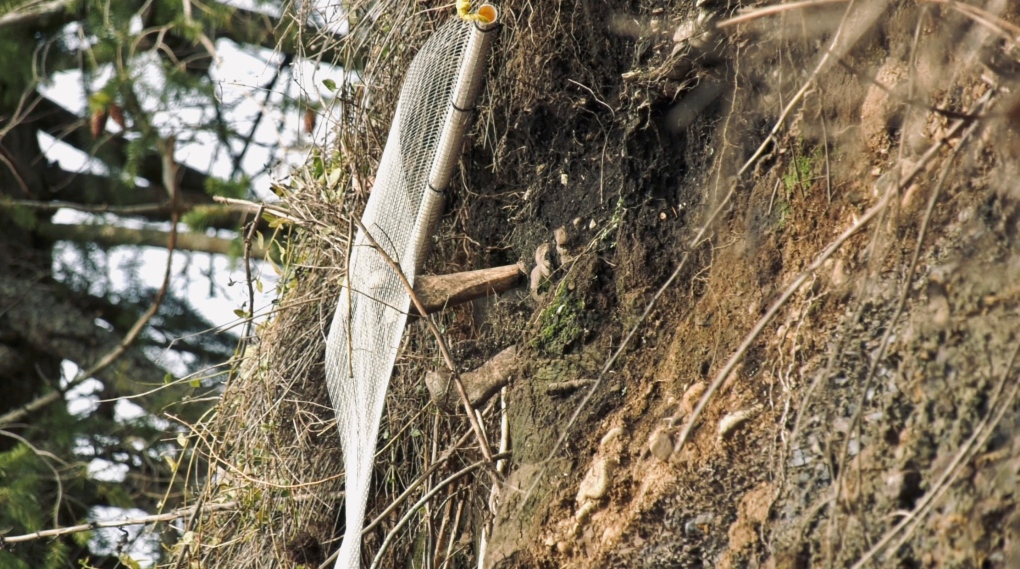Coastal erosion is unearthing ancestral bones on this B.C. Gulf Island
A walk past a cemetery can conjure many emotions – sadness, fear and finality. But rarely does it conjure the idea of actually seeing a deceased loved one again.
On British Columbia's Gabriola Island, however, coastal erosion is unearthing more than just memories.
"I come here and I go, 'What am I going to do about this?' says Jared Hooper, chair of the Gabriola Cemetery Commission.
The cemetery sits atop of a 10-metre cliff on South Road and faces Mudge Island to the west. The land was donated in 1882 by Magnus Edgar, an early settler who is also buried there along with his family.
"It’s a lovely peaceful cemetery,” he says. "Except for the problems we are having with bank slipping away."
Hooper's job is to watch over the island's only cemetery – a cemetery that's slowly sliding off a cliff and into the ocean.
"You can't stop it," he says. "You might as well let nature take its course."
Some of the island's earliest pioneers are buried on the bluff, with graves dating back to 1882.
Approximately 15 of those settlers are buried on what's called a midden, a refuse dump for domestic waste that was used by Snuneymuxw inhabitants centuries ago.
“That midden is full of broken clam shells and artifacts,” Hooper adds.
Geologists have told the cemetery that the lower area of the cemetery near the water is much softer because of the midden.
"It’s sliding seaward over harder layers lower down that go right down to the beach," says Hooper.
With the bank eroding by about 20 to 25 centimetres per year, and the caskets long since decomposed, the problem calls for some out-of-the-box thinking.
"I've got that wire basket hanging over the edge so they don't just fall down to the beach," Hooper says. "You can throw a million dollars at it and it’ll fall down in a number of years."
 Leg bones exposed on a bluff on Gabriola Island, B.C. (CTV News)
Leg bones exposed on a bluff on Gabriola Island, B.C. (CTV News)
He's slowly collecting the bones until full skeletons can be relocated up the hill and these unsettled settlers can settle once again.
"These bones, they are going to be coming out of the bank for who knows, 20, 30, 40 more years?"
Hooper has connected with some of the living relatives of the settlers buried on the island and they are OK with relocating the remains once the time comes, he says.
For those plotting their own burials on the island, there's still plenty of room in the back, Hooper says.
"We've got lots of room left for cremations – maybe 100 spots or more."
CTVNews.ca Top Stories

Canadian Olympic Committee offers 'heartfelt apology' after New Zealand accuses Canada Soccer of spying
The Canadian Olympic Committee offered a 'heartfelt' apology to New Zealand Football Tuesday after the New Zealand women's club accused the Canadian women's team of spying on them during a training session.
Jasper evacuees forced into B.C. to flee fires told to make U-turn to Alberta for aid
Thousands of wildfire evacuees forced from Jasper National Park into British Columbia along smoke-choked mountain roads Monday night were directed Tuesday to make a wide U-turn and head home if they needed a place to stay.
Pennsylvania state police commissioner reveals stunning details about Trump shooting
A local law enforcement commissioner revealed during a House Homeland Security hearing on Tuesday stunning new details about the security failures that led to the near assassination of Donald Trump, raising more questions for the embattled U.S. Secret Service.
Sunday was the hottest day ever recorded on Earth, scientists say
Sunday was the hottest day ever recorded, breaking global temperatures dating back to 1940, according to preliminary data from Europe's Copernicus Climate Change Service.
Polar bear at Calgary Zoo died by drowning following 'crushing' injury
The Wilder Institute/Calgary Zoo has revealed the cause of death for polar bear Baffin last week.
Clip resurfaces of Vance criticizing Harris for being 'childless,' testing Trump's new running mate
Comments Donald Trump’s running mate JD Vance made in 2021 questioning U.S. Vice President Kamala Harris’ leadership because she did not have biological children have resurfaced, testing the young conservative senator in his early days campaigning as part of the Republicans' presidential ticket.
Premier says fine-tuning needed for alert system after miscommunicated Jasper evacuation timing
Alberta's premier says changes are needed to the province's emergency alert system after incorrect information was shared about the Jasper evacuation on Monday night.
'I had to go into hiding': Manitoba man still being harassed after charges into alleged human trafficking ring dropped
A man whose charges were stayed following an investigation into an alleged child sex trafficking ring in Portage la Prairie says his life has been ruined.
'Stars are aligning' for Bank of Canada rate cut: economists
The Bank of Canada is expected to deliver a dose of interest rate relief Wednesday when economists and market watchers predict the central bank will cut its overnight lending rate.


































